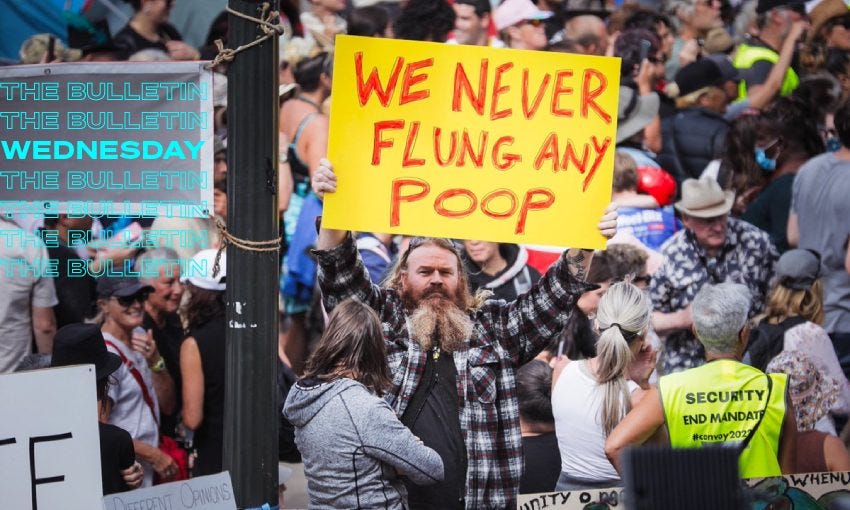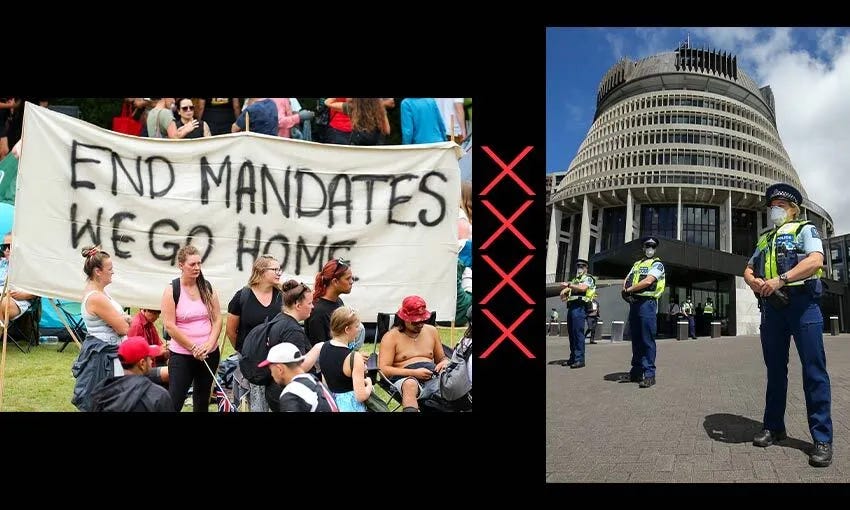On the ground in Wellington
Tensions rising at parliament as police tighten the perimeter around the ongoing occupation
Mōrena and welcome to The Bulletin for Wednesday, February 23, by Justin Giovannetti. Presented in partnership with Z Energy.
In today’s edition: Russia invades eastern Ukraine; concerns about long Covid health coverage; reserve bank expected to hike borrowing costs; but first, increasing tensions at the Wellington occupation.
The situation in Wellington is growing more tense and volatile. (Image: RNZ)
Protesters woke yesterday to a second morning of police tightening the perimeter around their encampment. The clock is ticking on the ongoing occupation of streets around parliament, with police warning that only days likely remain. Before dawn, a large group of officers moved concrete blocks closer to the centre of the occupation. They were met by protesters who threw acid and one who drove a car towards a phalanx of police carrying riot shields. The NZ Herald’s Adam Pearse described the scene as tensions rose and violence erupted. In a statement, police have said the protest is now “absolutely disgraceful” and warned that peaceful elements have lost control of a movement that is in its third week of being camped outside parliament. There’s been a stark shift in tone from the police commissioner’s call for patience and de-escalation last week. Stuff reports a “grim mood” has now settled over the occupation.
A live view of the Wellington protest. The Spinoff’s Stewart Sowman-Lund is in Wellington and writing live updates from the occupation outside parliament. He arrived on a busy day where former deputy prime minister Winston Peters showed up maskless and addressed protesters. Nearly at the same time, Wellington’s ambulance service announced that it is now too hazardous for emergency crews to access the site. Despite that, the Dominion Post reports that Wellington’s mayor has met with protesters. Any support within parliament seems to be fizzling though. After National and Act briefly considered adopting anti-mandate messages earlier this week, the opposition seems to have tried to distance itself from the increasingly ugly occupation in central Wellington.
Three things about the protest that you might not know. I asked Sowman-Lund what people outside of Wellington might not know about the occupation at parliament, here are three points he made:
“This is not an anti-mandate protest. While many of those in attendance at the Wellington occupation will continue to proclaim that they are there to speak out against mandates, it is clear from walking around the tents and stalls that it is about more than that. Most protest signs spread misinformation about the vaccine, while others simply target a myriad of other unrelated issues: three waters, significant natural areas, religious freedom and more.
It is (almost) a peaceful protest. I’ll be honest, I felt perfectly safe while wandering around among the protesters. I wore a mask and spoke to numerous people and only once was I told to ‘Take it off bro’. That being said, many of the signs that remain do not create a safe feeling. Misogyny directed at the prime minister is rife. Conspiracy theories about her partner are prevalent. Hatred directed at the media is commonplace. If the protesters are peaceful, maybe they should consider making their propaganda match?
The protest is really big. Like, really. Having reported on this protest from Auckland for the past two weeks, I thought I appreciated quite how big it was. In person, however, it’s significantly larger. The scale is almost impossible to describe. The streets around parliament are a bit like the first days of a zombie apocalypse, with empty cars parked haphazardly. Bus stations have become makeshift homes. It takes three times as long to walk anywhere. This is a big protest and, by the looks of things, it’s here to stay.”
The next few days will test New Zealand’s justice system. The Dominion Post reports that a number of arrested protesters have refused to give the court system their names, which has put them at risk of remaining in custody. Some who have given their names don’t seem to like being called by it. Attention is turning to the funding of the occupation, with a local businessman telling RNZ he’s donated money because of his opposition to MIQ. Of all the causes being highlighted at the protest, and they are many, the border isn’t one. Finally, The Conversation writes that the independence of the police is under strain as some members of the public loses faith in the police commissioner’s calls. Some of the protest leaders are now promising to spread the pain across New Zealand unless all Covid rules are scrapped in the next six days.
A quick word. With omicron cases increasing and tensions running high, there has never been a greater need for trustworthy and freely accessible journalism. The generous support of our members powers all of The Spinoff's Covid-19 coverage, from live updates to the award-winning mahi of Toby Morris and Siouxsie Wiles. Tautoko mai, join The Spinoff Members today.
Russian troops move into Ukraine. The Russian parliament recognised two regions of Ukraine as independent yesterday and sent in military units to secure the areas. As Reuters reports, the Donetsk and Luhansk regions (known collective as Donbass) in Ukraine’s east are still partly under Ukrainian control. In the coming days, the US and EU will unveil a series of punishing economic sanctions. Germany, Russia’s largest consumer of natural gas, started by freezing a large new pipeline. There are now nearly 190,000 Russian troops on Ukraine’s border and a large invasion is still feared.
New Zealand’s foreign minister condemned the move. Nania Mahuta declared the decisions by Russia yesterday were a “pretext for invasion” and said there’s no basis in international law to recognise the two so-called republics, according to Stuff. If that seems like a strong statement from New Zealand, and it is, that’s because the Russian president has left no room for interpretation about his true goals. Vladimir Putin delivered what The Guardian called a long, “angry and rambling lecture” where he said Ukraine has no right to exist. It was a stunning speech, the kind you wouldn’t think could happen in the 21st century. The Atlantic concluded that Putin has chosen war to overturn the changes to the international order since the end of the Cold War.
A case that raises concerns about how New Zealand will deal with long Covid. Daniel Lavender tested positive for Covid-19 in late 2020 while working as a cabin crew member for Air New Zealand. He was made redundant days after he tested positive. After losing his job, he suffered from symptoms of long Covid, including severe brain fog and heart palpitations. According to RNZ, when he submitted a claim to ACC he was rejected by Air New Zealand. Much of the reasoning revolved around whether he got Covid on the job and the ill-defined nature of long Covid. Experts warn the government needs to come up with clear rules before a wave of claims hits ACC.
The Spinoff’s Covid data tracker has the latest figures.
Spotted The Spinoff on your commute? We've just launched our first-ever brand marketing campaign, celebrating the site’s refresh and shining a very big, very bright spotlight on some of our favourite work of the last little while. To learn about what we’re up to, check out Campaign Brief's piece on the launch. And if you're keen to chat commercial opportunities, get in touch with our commercial director Saj Patel.
The reserve bank is expected to increase the cost of borrowing later today. In only a few months the official cash rate will have gone from a record low 0.25% to 1% (or higher) today. Stuff reports that some first-home buyers will start to feel the pinch of increasing interest rates in the coming months. However the good news is that rates are going from extremely cheap to very cheap, so most households should be able to afford what’s coming. Which is needed, because economists expect the reserve bank’s OCR to keep climbing rapidly into next year.
Eleven years after the Christchurch earthquake, some homeowners are still dealing with unsettled claims. More than half a million claims were made with the Earthquake Commission after the 2011 earthquake and some in Christchurch told RNZ they feel abandoned. A lawyer dealing with some of the claims, no figure was provided for how many are outstanding, said the system just wasn’t designed to last for a decade.
Bull now a ‘legend’ after surviving 80km trip down river. The Otago Daily Times reports on the amazing story of an 18-month-old bull grazing in a paddock near Maruia Falls who got caught in flood waters. A week later, the bull was found nearly 80km down river after a journey that included going over 10m falls. A farmer found the bull snuffling near a blackberry bush and dug him out. After his death-defying journey, the bull is being retired to a green paddock where he can live out his days with some cows. Well deserved.
Got some feedback about The Bulletin, or anything in the news?
Get in touch with me at thebulletin@thespinoff.co.nz
Right now on The Spinoff: Toby Manhire looks at claims that a “chasm of division” has opened in New Zealand after weeks of protest. Justin Latif details how new funding aims to tackle both omicron and long-standing health inequities. Steve Danby writes about a short story that details the cost of being gay in the 80s. Sela Jane Hopgood covers a call for more Pasifika architects in Aotearoa. Naomii Seah reports on the truth behind the hazard light “thank you” flash.
Chiefs first to leave the Queenstown bubble. The Chief’s match against Moana Pasifika this weekend has been called off due to a Covid outbreak in the new team, so the Hamilton players are headed home. The bubble largely worked in keeping omicron out, but Moana Pasifika wasn’t lucky. Most of the players haven’t seen their families in a few weeks. RNZ reports that Moana Pasifika could still make its Super Rugby debut next week.







